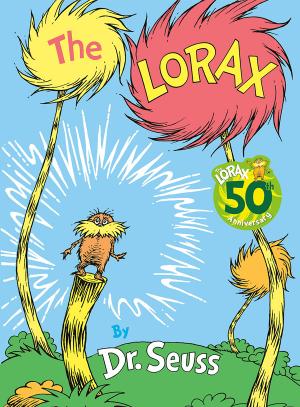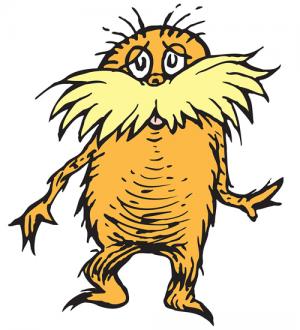By Nancy Brannon, Ph.D.
On August 12, 2021, Elizabeth Blair brought to the attention of NPR listeners that Dr. Seuss’ book The Lorax celebrated its 50th anniversary the same week that the United Nations and the IPCC released the report on the dire consequences of human-induced climate change. She said, “The conflict between the industrious, polluting Once-ler and the feisty Lorax, who ‘speaks for the trees,’ feels more prescient than ever.”
Blair quoted anthropologist and evolutionary biologist Nathaniel Dominy at Dartmouth about the book: “He wanted a book that captured the effects of pollution on ecosystems and I would say it was really ahead of its time. The different species disappear from the narrative in succession. The Bar-ba-loots leave because they run out of food. The Swomee-Swans leave because the air is polluted. The humming fish leave because the water’s polluted. He’s describing what we would now call a ‘trophic cascade,’ and for me, as a scientist, I just find that genius that he anticipated that concept by a decade or more.”
Blair explains the history of the book: “[Theodore] Geisel began writing The Lorax at a time of growing concern about the environment.” According to his biographer Donald Pease, Geisel and his wife went on a trip to the Mount Kenya Safari Club, where he caught a view in the mountains of elephants crossing. Inspired by the beautiful landscape, he wrote most of this book in one afternoon. It was published in August, 1971.
So I decided it would be a good time to take review of this book. Here’s the story:
Once there was a glorious land with plenty of Truffula Trees filled with Truffula Fruits, where Swomee-Swans sang, Brown Bar-ba-loots frolicked, and Humming-Fish splashed in the clear-water pond. But all that is now gone and an exploring little boy wonders how the beautiful land was turned into a wasteland.
The Once-ler, who hides in his towering, teetering boarded-up house, tells the boy the story of how the Lorax got taken away. The Once-ler explained how the land looked when he first came to it. “In the days when the grass was still green and the pond was still wet and the clouds were still clean and the song of the Swomee-Swans rang out in space, one morning I came to this glorious place.”
The Once-ler decided to stay and opened a small shop, where he would knit a Thneed from the tufts of the Truffula Tree. He chopped down a Truffula Tree, was thrilled with his Thneed, and decided to make more Thneeds. That meant chopping down more Truffula Trees.
Disturbed by all this chopping down of Truffula Trees, the Lorax appeared to the Once-ler to speak for the trees. “I speak for the trees for the trees have no tougues…” The Once-ler claimed he was doing no harm by chopping down just one tree and, besides, the Thneed was “a fine something that all people need.” But the Lorax replied, “Sir! You are crazy with greed.”
As the Once-ler started selling Thneeds, he cut down more trees, and got caught in a cycle of manufacturing more and more, while cutting down more and more trees and “growing” his business. He even acquires a Super-Axe-Hacker to cut down more trees at a time.
Again, the Lorax appears: “I’m the Lorax who speaks for the trees, which you seem to be chopping as fast as you please.” Now there is insufficient Truffula Fruit to feed the Brown Bar-ba-loots, so they must leave to find food elsewhere.
As the Thneed factory grows, it emits more air pollution. “Once-ler! You’re making such smogulous smoke! My poor Swomee-Swans can’t sing a note!” said the Lorax as he coughed. So the Swans had to go “to escape from the smog you’ve smogged-up around here.”
To add to the misery, the Once-ler’s factory is polluting the clear waters where the Humming-fish hummed. “No more can they hum, for their gills are all gummed,” complained the Lorax. So the fish had to leave, too, “in search of some water that isn’t so smeary.”
Eventually the Once-ler felled the last Truffula Tree. Since there were no more trees to make more Thneeds, the Once-ler and all his factory workers and relatives jumped in their cars “and drove away under the smoke-smuggered stars. Now all that was left ‘neath the bad-smelling sky was my big empty factory … the Lorax … and I.”
The Lorax then “heisted himself and took leave of this place, through a hole in the smog, without leaving a trace. And all that the Lorax left here in this mess was a small pile of rocks, with the one word – UNLESS.”
What is the meaning of UNLESS? “Unless someone like you cares a whole awful lot, nothing is going to get better. It’s not.”
So what can be done? Plant a new tree and “treat it with care. Give it clean water. And feed it fresh air. Grow a forest. Protect it from axes that hack. Then the Lorax and all of his friends may come back.”
Planting trees can take root in your land and your heart – if only you give a hoot. That’s what Wangari Maathai did, who founded The Green Belt movement, which planted more than 51 million trees across Kenya. Maathai once said, “My mother ... always talked about trees as a symbol of hope and so The Lorax in many ways was that and remains that for me. That each of us can be such a potent agent of change. We can be custodians of hope.” Maathai was the Nobel Peace Prize laureate in 2009. She died in 2011 at age 71.
Sources:
Blair, Elizabeth. 2021. “The Lorax Warned Us 50 Years Ago, But We Didn’t Listen.” NPR Morning Edition. August 12. https://www.npr.org/2021/08/12/1026385429/the-lorax-dr-seuss
Coleman, Korva. 2011. “Nobel Laureate Wangari Maathai: A Global Icon of Conservation.” NPR The Two-Way. Sept. 26. https://www.npr.org/sections/thetwo-way/2011/09/26/140808866/nobel-laureate-wangari-maathai-a-global-icon-of-conservation
On August 12, 2021, Elizabeth Blair brought to the attention of NPR listeners that Dr. Seuss’ book The Lorax celebrated its 50th anniversary the same week that the United Nations and the IPCC released the report on the dire consequences of human-induced climate change. She said, “The conflict between the industrious, polluting Once-ler and the feisty Lorax, who ‘speaks for the trees,’ feels more prescient than ever.”
Blair quoted anthropologist and evolutionary biologist Nathaniel Dominy at Dartmouth about the book: “He wanted a book that captured the effects of pollution on ecosystems and I would say it was really ahead of its time. The different species disappear from the narrative in succession. The Bar-ba-loots leave because they run out of food. The Swomee-Swans leave because the air is polluted. The humming fish leave because the water’s polluted. He’s describing what we would now call a ‘trophic cascade,’ and for me, as a scientist, I just find that genius that he anticipated that concept by a decade or more.”
Blair explains the history of the book: “[Theodore] Geisel began writing The Lorax at a time of growing concern about the environment.” According to his biographer Donald Pease, Geisel and his wife went on a trip to the Mount Kenya Safari Club, where he caught a view in the mountains of elephants crossing. Inspired by the beautiful landscape, he wrote most of this book in one afternoon. It was published in August, 1971.
So I decided it would be a good time to take review of this book. Here’s the story:
Once there was a glorious land with plenty of Truffula Trees filled with Truffula Fruits, where Swomee-Swans sang, Brown Bar-ba-loots frolicked, and Humming-Fish splashed in the clear-water pond. But all that is now gone and an exploring little boy wonders how the beautiful land was turned into a wasteland.
The Once-ler, who hides in his towering, teetering boarded-up house, tells the boy the story of how the Lorax got taken away. The Once-ler explained how the land looked when he first came to it. “In the days when the grass was still green and the pond was still wet and the clouds were still clean and the song of the Swomee-Swans rang out in space, one morning I came to this glorious place.”
The Once-ler decided to stay and opened a small shop, where he would knit a Thneed from the tufts of the Truffula Tree. He chopped down a Truffula Tree, was thrilled with his Thneed, and decided to make more Thneeds. That meant chopping down more Truffula Trees.
Disturbed by all this chopping down of Truffula Trees, the Lorax appeared to the Once-ler to speak for the trees. “I speak for the trees for the trees have no tougues…” The Once-ler claimed he was doing no harm by chopping down just one tree and, besides, the Thneed was “a fine something that all people need.” But the Lorax replied, “Sir! You are crazy with greed.”
As the Once-ler started selling Thneeds, he cut down more trees, and got caught in a cycle of manufacturing more and more, while cutting down more and more trees and “growing” his business. He even acquires a Super-Axe-Hacker to cut down more trees at a time.
Again, the Lorax appears: “I’m the Lorax who speaks for the trees, which you seem to be chopping as fast as you please.” Now there is insufficient Truffula Fruit to feed the Brown Bar-ba-loots, so they must leave to find food elsewhere.
As the Thneed factory grows, it emits more air pollution. “Once-ler! You’re making such smogulous smoke! My poor Swomee-Swans can’t sing a note!” said the Lorax as he coughed. So the Swans had to go “to escape from the smog you’ve smogged-up around here.”
To add to the misery, the Once-ler’s factory is polluting the clear waters where the Humming-fish hummed. “No more can they hum, for their gills are all gummed,” complained the Lorax. So the fish had to leave, too, “in search of some water that isn’t so smeary.”
Eventually the Once-ler felled the last Truffula Tree. Since there were no more trees to make more Thneeds, the Once-ler and all his factory workers and relatives jumped in their cars “and drove away under the smoke-smuggered stars. Now all that was left ‘neath the bad-smelling sky was my big empty factory … the Lorax … and I.”
The Lorax then “heisted himself and took leave of this place, through a hole in the smog, without leaving a trace. And all that the Lorax left here in this mess was a small pile of rocks, with the one word – UNLESS.”
What is the meaning of UNLESS? “Unless someone like you cares a whole awful lot, nothing is going to get better. It’s not.”
So what can be done? Plant a new tree and “treat it with care. Give it clean water. And feed it fresh air. Grow a forest. Protect it from axes that hack. Then the Lorax and all of his friends may come back.”
Planting trees can take root in your land and your heart – if only you give a hoot. That’s what Wangari Maathai did, who founded The Green Belt movement, which planted more than 51 million trees across Kenya. Maathai once said, “My mother ... always talked about trees as a symbol of hope and so The Lorax in many ways was that and remains that for me. That each of us can be such a potent agent of change. We can be custodians of hope.” Maathai was the Nobel Peace Prize laureate in 2009. She died in 2011 at age 71.
Sources:
Blair, Elizabeth. 2021. “The Lorax Warned Us 50 Years Ago, But We Didn’t Listen.” NPR Morning Edition. August 12. https://www.npr.org/2021/08/12/1026385429/the-lorax-dr-seuss
Coleman, Korva. 2011. “Nobel Laureate Wangari Maathai: A Global Icon of Conservation.” NPR The Two-Way. Sept. 26. https://www.npr.org/sections/thetwo-way/2011/09/26/140808866/nobel-laureate-wangari-maathai-a-global-icon-of-conservation










